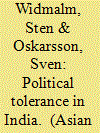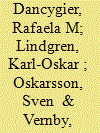| Srl | Item |
| 1 |
ID:
120960


|
|
|
|
|
| Publication |
2013.
|
| Summary/Abstract |
This study of political tolerance in India reveals a positive correlation between such tolerance and membership in political parties and unions, and living in urban areas. Surprisingly, the study finds no difference in the levels of political tolerance between BJP and Congress (I) supporters, and no connection with education levels.
|
|
|
|
|
|
|
|
|
|
|
|
|
|
|
|
| 2 |
ID:
131499


|
|
|
|
|
| Publication |
2014.
|
| Summary/Abstract |
This article analyzes a rich Swedish data set with information on the electoral turnout of a large sample of adoptees, their siblings, their adoptive parents, and their biological parents. We use a simple regression framework to decompose the parent-child resemblance in voting into pre-birth factors, measured by biological parents' voting, and post-birth factors, measured by adoptive parents' voting. Adoptees are more likely to vote if their biological parents were voters and if they were assigned to families in which the adoptive parents vote. We find evidence of interactions between the pre- and post-birth factors: the effect of the post-birth environment on turnout is greater amongst adoptees whose biological mothers are nonvoters. We also show that the relationships between parental characteristics, such as education, and child turnout, persist even in the absence of a genetic link between parent and child. The regression-based framework we utilize provides a basis for the integration of behavior-genetic research into mainstream political science.
|
|
|
|
|
|
|
|
|
|
|
|
|
|
|
|
| 3 |
ID:
143141


|
|
|
|
|
| Summary/Abstract |
Widespread and persistent political underrepresentation of immigrant-origin minorities poses deep challenges to democratic practice and norms. What accounts for this underrepresentation? Two types of competing explanations are prevalent in the literature: accounts that base minority underrepresentation on individual-level resources and accounts that emphasize political opportunity structures. However, due to the lack of data suitable for testing these explanations, existing research has not been able to adjudicate between these theories. Using registry-based microdata covering the entire Swedish adult population between 1991 and 2010 our study is the first to empirically evaluate these alternative explanations. We examine election outcomes to municipal councils over the course of six elections and find that variation in individual-level resources cannot explain immigrants’ underrepresentation. Further, when comparing immigrants and natives who face comparable political opportunity structures a large representation gap remains. Instead, we argue that discrimination by party gatekeepers plays a more significant role in perpetuating the underrepresentation of immigrants than do individual resources or structural variables.
|
|
|
|
|
|
|
|
|
|
|
|
|
|
|
|